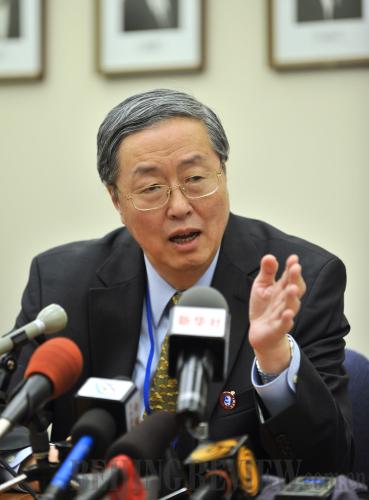|
 |
|
MORE HARM THAN GOOD: Zhou Xiaochuan, Governor of the People's Bank of China, cautioned that the U.S. quantitative easing policy might threaten the still weak global economy (ZHANG JUN) |
By revving up its money-printing machines, the United States will try to shock its economy back to life. But for the rest of the world, China included, this means financial uncertainties.
On November 3, the Federal Reserve announced it would buy $75 billion of long-term Treasury bills each month until the end of June 2011. The monetary expansion was accompanied by a pledge to keep interest rates at ultra-low levels for an "extended period."
The U.S. economy grew a modest 2 percent year on year in the third quarter, which many believe was not enough to reduce the nation's high unemployment.
In addition, U.S. policymakers have left the door open for an even bigger capital injection should growth remain lackluster. The Fed said it would "regularly review the pace of its securities purchases and will adjust the asset purchase program as needed to best foster maximum employment and price stability."
This is the second round of quantitative easing (QE2) after the Fed purchased $1.7 trillion worth of mortgage-backed securities and Treasury notes between December 2008 and March 2010 in a bid to prevent what would otherwise have been a deeper recession.
Supporters argue that QE2 is needed to speed up the pace of the U.S. recovery, since no other options are available now that the Fed has already lower interest rates close to zero. However, economists doubt the policy's effectiveness and fret over its ripple effect on the global economy.
"One danger lies in whether other nations will follow the U.S. lead in devaluing the greenback," said Constance Hunter, chief economist at Aladdin Capital Holdings LLC, an investment bank based in Stamford, Connecticut.
If one country devalues its currency, it can have a number of benefits, such as eliminating debt through inflation or jump-starting the economy. But if every country engages in competitive devaluation, it could cause deflation, she said.
The quantitative easing will lead to torrent capital inflows into emerging markets and create asset bubbles that could destabilize the world economy, said Shi Jianxun, an economics professor at the Tongji University based in Shanghai.
It is actually a form of indirect currency manipulation that could lead to a new round of currency wars and even a global economic collapse, he said.
Joseph Stiglitz, a professor at Columbia University and Nobel economics laureate, told Xinhua News Agency that the cost is bigger than the benefit when taking these moves. He noted that what the United States needs now is a second round of fiscal stimulus policies, not more liquidity.
Central banks in emerging markets are being forced to choose between passively letting these capital inflows push up their exchange rates—thereby negatively affecting their exports—or recycling these inflows into the U.S. Treasury bills yielding only 1 percent with a declining exchange value, said Michael Hudson, an economics professor at the University of Missouri.
Trouble for China
As the United States floods its economy with cheap credit, the greenback faces significant pressure to depreciate, casting an ominous shadow over the security of China's dollar assets.
In August, China boosted its holdings of U.S. Treasury securities by $21.7 billion to $846.7 billion, retaining its position as the largest foreign holder of U.S. government debt. The debt purchase is part of China's strategy to diversify its piling foreign exchange reserves, the world's largest at $2.65 trillion by the end of September.
Meanwhile, a weaker dollar will erode the competitive edge of Chinese goods, rubbing salt in the wounds of hard-hit exporters, said Lu Zhiming, a senior researcher at the China Bank of Communications.
The worst-case scenario would be a dangerous currency war and trade protectionism if more countries join quantitative easing, said Lu.
China's turbo-charged export machine came to a halt in early 2009 as foreign consumers were reluctant to spend. The sector regained some lost ground, drawing strength from a bounce-back in the world economy, but a full export recovery is still some way off due to a stronger yuan and cost inflation.
Evidence of this vulnerability was found at the 108th Canton Fair in October, a bellwether for the trade climate. The number of foreign buyers at the fair, which ran from October 15 to November 4, totaled 199,300, down 2.3 percent from the last session in April, said Canton Fair Deputy Secretary-General Liu Jianjun. The value of export deals hasn't reached pre-crisis levels, he said.
As the United States pushes a wave of liquidity into global markets, concerns are growing that more speculative capital may find its way into China, adding fuel to the inflationary jitters and asset bubbles.
Housing prices in China's 70 large and medium-sized cities grew a robust 8.6 percent year on year in October, despite an array of government measures to cool the property craze. Inflationary pressures have also stretched policymakers' nerves as natural disasters drove food prices up earlier this year.
| 